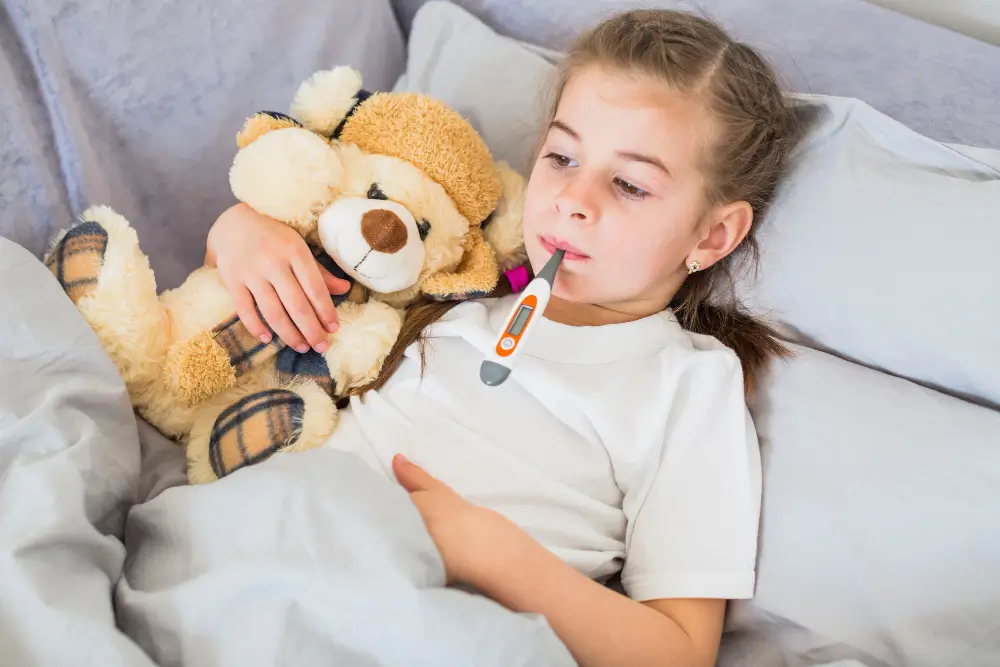During the winter months, children are at an increased risk of viral infection due to the presence of cold weather, which allows for the proliferation of many of the flu, RSV (Respiratory Syncytial Virus), and common cold pathogens. With their still-developing immune systems and the increased risk of exposure to pathogens from school and other children, children are particularly vulnerable to these types of virus-based infections and generally develop fever as an indicator that their immune system is working hard to fight off the viral invasion. In this article, we will discuss in detail winter fever in children and the signs parents should not ignore, along with advice backed by the best Children’s hospital in Chandigarh.

What are the commonly occurring infections in winter?
There are a few common types of inferred viral infections that may produce winter-related fevers in children:
- Flu and other viral infections
- Ear infections, throat infections
- Pneumonia or bronchitis
- RSV infections in infants
- Other seasonal types of influenza
In most cases, fevers will resolve with simple measures such as getting plenty of rest, drinking fluids, and following the doctor’s advice. It is also important to recognize if there are any additional symptoms indicating a more serious medical condition.
Parents Alert: Don’t Let These Signs Go Unnoticed
Some of the warning signs that every parent needs to be aware of:
- High Fever (102 degrees Fahrenheit, or greater)
If your child’s temperature is over 102°F (38.9°C) and it has not gone down with the use of medication, seek immediate medical attention.
- Difficulty Breathing
As per the Best pediatrician in Mohali, symptoms of a child with varying degrees of respiratory distress (e.g., rapid breathing, wheezing, pulling in their chest) could indicate pneumonia or bronchiolitis, both of which need medical attention.
- A Constantly Lethargic Child
Children who are constantly sleepy, seem to have little to no responsiveness, or who are difficult to wake, could potentially indicate a serious infection or dehydration.
- Seizures
Children who have febrile seizures that occur during high fevers should seek emergency care because they may be life-threatening, especially if they last more than just a few minutes.
- Not Wanting To Eat or Drink
It is important to understand that a child who is not eating or drinking can lead to dehydration, which is extremely dangerous, especially during a fever.
- Rashes During A Fever
It should also be noted that the presence of a rash during a fever could signal a serious health problem such as dengue, measles or another contagious disease. Therefore, it is imperative that when a fever exists, and if a rash appears at the same time, the child needs to be evaluated by a medical professional.
- Fever lasting longer than 3 days
There may be underlying infections or complications associated with prolonged fevers, which require proper medical attention.
What can parents do in case of winter fever in children?
- Keep their child hydrated
- Use fever-reducing medications (where appropriate) based on the physician’s instructions
- Encourage the child to rest and eat appropriately
- Monitor the child’s temperature on an ongoing basis
- Do not self-medicate or use antibiotics without the physician’s order
If you are looking for the Child fever treatment in Mohali, or the Best pediatrician in Mohali, Sohana Hospital might just be the best option for you. Sohana Hospital Mohali is home the the world’s most advanced technology and North India’s trusted pediatricians who provide the most compassionate and comprehensive care for your little ones. Book your appointment today!
